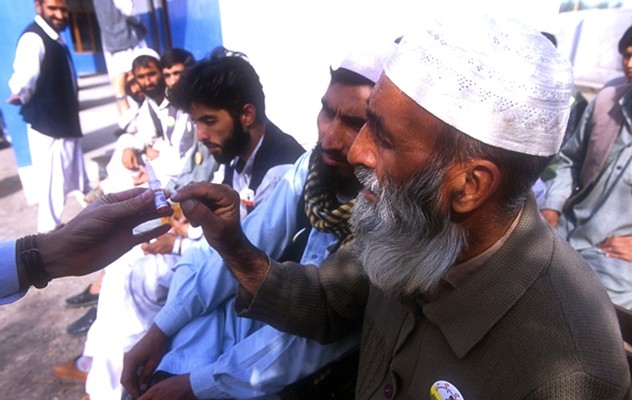
28 August 2012 – On the weekend of 31 August, prominent religious leaders from seven major sects in Pakistan who are supportive of polio eradication will travel to Saudi Arabia to attend a Conference on Children and Islam. These leaders represent religious leaders across Pakistan who are working to mobilise the community in support of polio vaccination and overcome widespread rumours that polio vaccination is anti-Islamic.
Refusals, and religious refusals in particular, are rare in Pakistan, with an average of only two per cent of the population refusing the vaccination during each campaign. However, in order to reach every last child, this is too high a figure, and one which polio staff and religious leaders are working hard to bring down.
When volunteers visit households on their vaccination rounds, they can find some families who persistently refuse to have their child vaccinated even when they are re-visited several times during the campaign. When parents cite religious reasons for refusing the oral polio vaccine (OPV), it is often due to a perception instilled by the teachings of an influential religious figure who has expressed reservations about the safety of the vaccine, or even the motives of the polio programme in general.
In some areas, localised resistance has been mobilised around the belief that the polio programme is a western plot to sterilise Muslims, or that the contents of the vaccine are not halal.
It is critical not only to provide correct information about the importance of polio vaccination, but also to help mobilise religious leaders to become advocates for the cause. In the high-risk areas of Pakistan, 1,085 social mobilisers are working to transform community perceptions.
Social mobilisers explain and dispel persistent myths about the vaccine and use passages from the Qur’an and the Hadith to emphasize the importance of children’s health . Fatwas from highly respected Islamic clerics also help to demonstrate that polio vaccine is not anti-Islamic. Once on board, religious leaders have the influence to successfully convince their followers to vaccinate their children and can call families from their mosques to vaccination points.
One such religious leader is the uncle of two-year-old Mehrama, from Quetta in Balochistan, who was diagnosed with polio in June this year. In this case the turning point came when he was shown a pro-vaccine video of Maulana Rafi Usmani, an influential religious scholar from his own Deobandi sect. In the July campaign, this influential leader inaugurated the vaccination campaign in his Union Council by vaccinating his one-year-old son and convincing eight other families who had previously persistently refused to vaccinate their children.
In areas that don’t have access to television or radio, the inter-personal connection that social mobilizers are able to establish is crucial: with persistent and appropriate interventions, one-to-one communication can not only change beliefs, but also behaviour. Across the 33 high risk districts in Pakistan, 1 out of every 2 parents who initially refuse the vaccine are later convinced of the importance of vaccination, according to UNICEF’s communications data. Thanks to the work of religious leaders, and increased commitment from the whole country towards the eradication goal, the total number of polio cases in Balochistan in the first half of this year was 3 compared to 19 by the same point in 2011.
There remains a lot of work to do, however. Children in Quetta Block continue to be missed – 16 % in Pishin in the March 2012 immunisation campaign. With the help of religious leaders and civil society to establish polio vaccination as a universal social norm, however, more children will enjoy a polio-free future.



